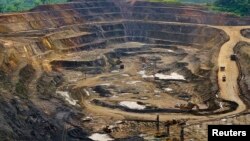The Democratic Republic of Congo's biggest-ever corruption probe was called off without an official explanation, according to both a Congolese lawmaker and a government spokesman. Investigators were looking into fraud that may have cost the government more than $3 billion.
It was an investigation of alleged corruption over four years, from 2009 to 2013, in the customs service of Katanga province in the southeastern DRC. Katanga is the source of most of the DRC’s mineral exports and a powerhouse for the rest of the economy.
Last week, opposition lawmaker Mushizi Kizito called for a judicial inquiry into the alleged corruption to be restarted.
Speaking to VOA, he said the investigation was launched in 2013 after Communications Minister Lambert Mende heard accusations about the service.
Kizito said he does not know who denounced what exactly, but there was information indicating serious corruption and fraud and Mende sent a letter about this to the Justice Ministry.
Initiating an investigation
This led to the state prosecutor sending a team of investigators to Katanga in September 2013. According to Kizito, the team managed in only 10 days to recover some $700 million in unpaid customs and other taxes. He said the team was then recalled to Kinshasa, though, before it had examined most of the relevant documents for the period.
Mende confirmed to VOA he initiated the investigators’ mission to Katanga.
“I don’t know if they recovered any money”, he said. "They did identify large amounts of tax owed that had not been paid, but the mission was terminated abruptly, we don’t know by whom. Anyway, it would be worth reopening the inquiry.”
Kizito said the team recovered more than $700 million, but he added that was far less than the estimated total that was owed.
“It was estimated to be $3 billion,” he said. “Two-hundred-seventy-nine businesses were implicated — all kinds of businesses including companies in mining, beverages, services, and import export.”
That much money would have been a hefty proportion of the annual state budget of about $8 billion, Kizito added, suggesting there might have been fraud on the same scale in the other 10 provinces.
He cautioned that some of the estimated $3 billion might have been legal tax avoidance, through transfer pricing and other means, rather than illegal tax evasion.
Following the dollar
He said this was for prosecutors to establish, however, and he said it was a pity the DRC’s first ever-tax investigation of this scale had not been pursued.
A spokesman for Congolese organization, the African Association for the Defense of Human Rights (ASADHO), said it had access to details of the 2013 inquiry.
An ASADHO activist from Katanga, Francois Katende, told VOA he could confirm that money had been recovered from companies in Katanga.
He said he has a list of 10 companies that made payments after ASADHO publicized the affair.
He also suggested that most of the $700 million was recovered from just two companies.
As for who called a halt to the investigation in 2013, Kizito, Katende and minister Mende all said they do not know who was responsible for that decision.
It is not clear how much money there is left to recover, or what has happened to any money that was recovered. It also is not clear if anyone in the customs service has been punished for the alleged fraud.




